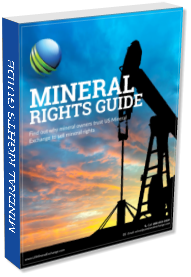
Mineral Rights and Medicaid Eligibility
At US Mineral Exchange we commonly get asked about mineral rights and medicaid eligibility. If you are trying to qualify for medicaid, your mineral rights could be an asset that disqualifies you from medicaid. However, the rules can get complicated and this article will help point you in the right direction. The most important thing to understand is that the rules vary from one state to another! In addition, your specific family situation will play a role in your eligibilty. A single mother, disabled individual, or elderly couple will all have different eligibility depending upon the state.

FREE GUIDE
Download our free mineral rights guide now! Learn more about your mineral rights.

Garrett Phelan
CEO of US Mineral Exchange with over 27 years of experience in the oil and gas industry. For nearly two decades, he has helped individuals, families, trusts, and non-profits navigate the complexities of mineral and royalty rights to achieve the highest sale prices.
Widely recognized as an industry expert, with an unwavering commitment to a client-first philosophy and extensive industry knowledge, he has been featured in Hart Energy, Yahoo Finance, and the Permian Basin Petroleum Association magazine.
Legal Disclaimer
The information provided in this article is for informational purposes only. US Mineral Exchange is not liable or responsible for any party who uses or relies on this information when applying for or being approved/denied for Medicaid. The information provided below is simply our opinion of matters related to Medicaid eligibility. You should consult with a qualified Medicaid Attorney and Accountant before applying for Medicaid.
Mineral Rights as Income or an Asset
When you are applying for Medicaid, there are two ways that your mineral rights might affect your qualification. The “asset value” and “income value” of your mineral rights. When applying for Medicaid there are monthly income limits. There is also a limit on the total value of your assets to qualify for Medicaid.
Since the rules vary by state, we are going to focus on how to determine the “income value” and “assett value” of your mineral rights. It’s important for you to check the specific rules in your state to see how these values affect your ability to qualify for medicaid.
Mineral Rights as Income
When looking at mineral rights and medicaid eligibility, one of the issues is how much income you have each month. Your royalty income can vary significantly month over month. Since royalty income varies significantly, it is our opinion that the average net royalty income from the last 6 months be used to determine your monthly income.
On your check stubs, there will be a gross royalty income and a net royalty income. According to the Texas medicaid rules, they have the following to say about how to account for either the gross or net:
Some documents concerning royalty payments will provide both a gross and a net payment amount. When the difference between the gross and the net figures is due to income taxes withheld or windfall profit tax deductions, use the gross figure when determining income.
When the difference between the gross and net figures represents a production or severance tax (most oil royalties will be reduced by this tax), use the net figure when determining income. The production or severance tax is a cost of producing the income and, therefore, is deducted from the gross income.
It is extremely uncommon for income taxes to be withheld on your royalty checks. This generally occurs when you have failed to provide the correct information to the operator and they subject you to the 28% withholding requirement. Unless this is your situation, you should use the net amount on your check stubs. The net amount is the amount you actually deposit into your bank each month.
To determine your average monthly income from royalties, assuming you do not have backup withholding, add the actual amounts you have deposited for the last 6 months and then divide by 6. This will give you your average monthly royalty income for the prior 6 months. It is our opinion that this is a fair representation of your current monthly royalty income.
It is important to point out that there are a large number of factors that could affect your royalty income going forward. If new wells were recently drilled, wells were re-completed, new wells get drilled, a well gets shut in, or any other number of situations occur, your royalty income could significantly change. It is impossible to perfectly predict what will happen going forward. This is why we believe using the average net income from the prior 6 months is the best indicator of royalty income for medicaid eligibility.
Mineral Rights as an Asset
Another test to determine if you qualify for medicaid is the total value of your assets. Remember that each state is different. Some states allow you to ignore mineral rights as an asset if the income is below a certain threshold. According to The Garrett Law Firm, you do not have to show an asset if the income value is below $6,000/year in Texas. The rules about the value of mineral rights as an asset for Medicaid may vary in your state.
If we ignore specific rules in individual states like the one mentioned above, how do we determine what the asset value of mineral rights is for Medicaid eligibility? The truth is that there is no 100% perfect way to determine the asset value of mineral rights. Below is simply our conservative opinion of the asset value of mineral rights. You should consult with your local attorney and/or accountant to determine the value of your mineral rights assets.
The value of mineral rights assets for Medicaid eligibility depends on the status of your property. Your mineral rights can either be producing, leased, or non-producing. Check out our property types article for more information about the differences. The value of each type of property will be different. Below is our opinion of how to value your mineral rights for Medicaid purposes based upon the status of your property:
Producing Mineral Rights
If you currently receive royalty checks you have producing mineral rights. To determine the asset value of mineral rights for Medicaid eligibility, we believe that using 40 months times your average royalty income is fair. If you needed to sell mineral rights quickly for Medicaid eligibility, generally speaking you will find a buyer who is willing to pay 40 months times your average royalty income. The only exception is if you have a new well(s) drilled and your income is about to drop dramatically.
To determine the asset value of your producing mineral rights for Medicaid eligibility, take the average amount you have received over the last 3 months and multiple by 40. For example, if you have received an average of $100 per month over the last 3 months, the asset value of your producing mineral rights would be $4,000.
Important note: The market value of mineral rights is determined by selling your mineral rights. The information above is simply an estimate. Your mineral rights could be worth more or less on the open market. Selling mineral rights in a competitive bidding situation is the only way to establish true market value.
Leased Mineral Rights
If you have an active oil and gas lease but you do not receive royalty income, you have leased mineral rights. As general rule of thumb, you can sell leased mineral rights between 2x to 3x the amount you received for a lease bonus. We would conservatively estimate the asset value of leased mineral rights at 2x the lease bonus amount for the purposes of Medicaid eligibility.
Important note: The market value of mineral rights is determined by selling your mineral rights. The information above is simply an estimate. Your mineral rights could be worth more or less on the open market. Selling mineral rights in a competitive bidding situation is the only way to establish true market value.
Non-Producing Mineral Rights
If you own mineral rights that are not currently leased and you do not get royalty income, you have non-producing mineral rights. Generally speaking, mineral rights that are non-producing and not currently leased have little to no value. According to Texas Medicaid rules, if you have non-producing mineral rights they require you to mark the asset value as $100.
The rules in your state may vary, but it is our opinion that non-producing mineral rights should be valued between $0 and $100. Unless you have received a current offer within the last 3 months for more than $100, we believe it is fair to assume a value of $0 to $100 as non-producing mineral rights are difficult or impossible to sell.
Consulting with a Medicaid Attorney and Accountant
No matter which state you are in, determining your assets, income, and Medicaid eligibility is a complicated task. There are many personal factors and rules to consider. We highly recommend that you consult with a qualified Medicaid Attorney and/or accountant in your state to help determine your Medicaid eligibility. The information we have provided above is simply our opinion based upon our experience within the industry.
Popular Content
- Sell Mineral Rights
- Mineral Rights Value
- Calculate Value
- Market Value
- Mineral Rights Buyers
- Mineral Rights Appraisal
- Mineral Rights Brokers
- Should you Sell Mineral Rights
- Never Sell Mineral Rights
- 10 Helpful Tips
- Mineral Interest Types Explained
- Common Mistakes
- Mineral Rights & Taxes
- Medicaid & Mineral Rights
- Common Q&A
Free Consultation
Free Consultation
Common Questions
The more information you can provide about your property the better! We can give you a better idea about the value of selling mineral rights if you provide more information. The most important thing we need is for you to answer the questions and provide your state and county.
If you have the required documents to list, providing those is extremely helpful!
Absolutely not! When you inquire at US Mineral Exchange we will not be putting any pressure on you to sell. We will help answer any questions you have whether you are interested in selling or not.
At US Mineral Exchange, we take privacy very seriously. We will NEVER sell your information or use it without your consent. When you send us documentation or tell us about your property, that information does not go outside our company without your consent. Even when you list a property for sale on our website, we strictly control who has access to the information about your listing so that only legitimate buyers will be able to see property details.
Many mineral owners make the mistake of getting an offer and quickly selling. They then accept an offer far below market value because they felt pressure to sell. There is nearly always a better price available.
Imagine you were selling a home. Would you get the best price from a random person who walks up and makes you an offer? No way! Now imagine you list the home on the MLS where thousands of potential buyers know your house is for sale. The key to getting the best price is competition. Our guide to selling mineral rights explains everything.
The reason that so many mineral owners decide to sell mineral rights at US Mineral Exchange is access to our large network of mineral rights buyers. Our goal is to help you get top dollar for selling mineral rights by getting your property in front of a huge audience of buyers. This allows buyers to compete against one another which ensures you get fair market value for selling mineral rights.
There are absolutely no cost to list your property. When you locate a buyer by listing your property with us, we are paid a commission directly by the buyers closing agent. This means you never have any out of pocket expenses ever. We only get paid if we can get you a better price than the current offer you have in hand.

FREE GUIDE
Download our free mineral rights guide now! Learn more about your mineral rights.



